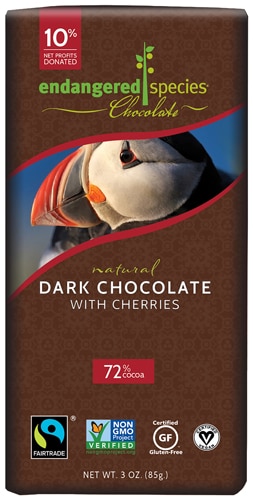[vc_row][vc_column][vc_column_text]If you love chocolate, prepare to turn a little sour over the price of your favorite sweet during 2024.
A cocoa shortage caused prices of the bean to more than double over the first quarter of this year, and
costs are now three times higher than they were 12 months ago, according to a National Public Radio report.
Bad weather and climate change are being blamed for three straight years of meager crop harvests in West Africa, where about two-thirds of the world's cocoa beans are grown.
The lack of supply has pushed up prices throughout the chocolate manufacturing and selling process, and many customers are seeing those higher costs when they grab a chocolate bar.

What is causing the cocoa shortage?
Cocoa farmers in Africa have endured years of wild weather conditions. At times, drenching rains have flooded crops. At the other extreme, high winds during the dry season have contributed to poor harvests.
In addition to the weather, pests and disease have ravaged crops. Many West African cocoa trees are aging and do not produce as much cocoa as they did in the past.
Bad road conditions associated with the weather also have made it more difficult to get the crops to ports.
The shortfall plaguing producers in Côte d’Ivoire and Ghana has resulted in a year-over-year cocoa decrease of 28% at Ivorian ports and 35% at Ghanaian ports, according to the
International Cocoa Organization.
All of these factors have reduced supply, causing prices to shoot higher.
How is the cocoa shortage impacting the price of chocolate?
In recent months, the price of some chocolate bars and other chocolate products has been climbing. Hershey, Nestle and Mondelez – which owns Cadbury – all have raised prices, according to NPR.
In other cases, manufacturers are shrinking the size of their products – an action often referred to as “shrinkflation” – rather than hiking prices. Mars is one company that has taken this approach.
Overall,
prices for chocolate products jumped 11.6% in 2023, according to data from market research firm Circana.
When will the cocoa shortage end?
Don’t expect relief from higher cocoa prices any time soon. A poor harvest is expected again this year, which means the cocoa shortage is likely to continue.
Cocoa bean prices are now so elevated that many major African cocoa plants have slowed or stopped processing efforts because they cannot afford to pay the exorbitant prices for the beans, according to a Reuters report.
Some market watchers have speculated that
until demand for cocoa drops, prices will remain sky high.
The pros and cons of eating chocolate
The cocoa shortage – and the rise in prices – is bad news for the millions of people who love chocolate.
Chocolate itself offers a mix of pros and cons for those who eat it. In some ways, the treat can be good for you, says Catherine Rall, a registered dietitian at the women’s wellness company
Happy V.
“Dark chocolate in particular offers a lot of health benefits, including improved cardiovascular health and plenty of antioxidants,” she says.
Research shows that the flavonoids in chocolate can improve heart health and brain function, says Scott Keatley, a registered dietitian and co-owner of
Keatley MNT, a private nutrition practice in New York City.
Dark chocolate is a good source of minerals such as iron, magnesium and zinc, he adds.
“Some studies suggest that the flavonoids in dark chocolate can enhance cognitive function, potentially improving memory and processing speed,” Keatley says.
However, both Rall and Keatley note that chocolate is also high in saturated fat, cholesterol and sugar. That can lead to weight gain and other health problems.
“It can be calorie-dense, offering little in the way of satiety compared to its caloric intake,” Keatley says, adding that many people eat too much chocolate.
Chocolate also contains caffeine and theobromine, which can affect sleep patterns or cause jitteriness in sensitive individuals, especially if it is consumed in large amounts or in the evening, Keatley says.
Healthy alternatives to chocolate
Nobody likes to see their favorite treat jump in price. But perhaps the rise in cocoa prices is an opportunity to look for better alternatives to snacking on chocolate.
If you truly love chocolate, one alternative might be to simply eat less of it, Rall says.
“The key to enjoying any food is moderation,” she says. “Eating a single, small serving of chocolate once a day or less isn’t going to cause any adverse health issues.”
Another options might be to skip the chocolate bar and turn to Nutella, which Rall says was developed to deal with a chocolate shortage during World War II.
“The key ingredient -- besides chocolate -- is hazelnuts, which are full of protein, iron, potassium, fiber, magnesium, iron and B vitamins,” Rall says.
Keatley says eliminating chocolate is probably not going to be an option for those who love it.
“If you love chocolate, do not eliminate it or swap it out for something else,” he says. “People have been sailing around the world for a millennia for chocolate: There are no good swaps.”
Instead, his suggestion echoes Rall: Try to find ways to moderate your intake.
“A few pieces of dark chocolate with a serving of
almonds can provide a satisfying snack with the added benefit of healthy fats and protein,” he says.
Keatley says other healthy ways to get your chocolate fix might include:
- Berries and a small amount of dark chocolate, preferably with a percentage of cocoa that is at least 70%
- Yogurt with chocolate and a drizzle of honey
- Roasted chickpeas with cocoa powder and a touch of sweetener
“Consider the role of chocolate in your overall diet and aim for balance,” Keatley says. “If you enjoy chocolate, plan it as part of your snack strategy rather than an impulsive addition.”[/vc_column_text][/vc_column][/vc_row][vc_row][vc_column][vc_text_separator title="Featured Products" border_width="2"][vc_row_inner equal_height="yes" content_placement="middle" gap="35"][vc_column_inner width="1/3"][vc_single_image image="174412" img_size="full" alignment="center" onclick="custom_link" img_link_target="_blank" css=".vc_custom_1713383987187{padding-right: 7% !important;padding-left: 7% !important;}" link="https://www.vitacost.com/taza-chocolate-organic-dark-chocolate-bar-stone-ground"][/vc_column_inner][vc_column_inner width="1/3"][vc_single_image image="174413" img_size="full" alignment="center" onclick="custom_link" img_link_target="_blank" css=".vc_custom_1713384108367{padding-right: 7% !important;padding-left: 7% !important;}" link="https://www.vitacost.com/vitacost-certified-organic-cocoa-powder"][/vc_column_inner][vc_column_inner width="1/3"][vc_single_image image="174411" img_size="full" alignment="center" onclick="custom_link" img_link_target="_blank" css=".vc_custom_1713384136819{padding-right: 7% !important;padding-left: 7% !important;}" link="https://www.vitacost.com/navitas-organics-cacao-sweet-nibs-8-oz"][/vc_column_inner][/vc_row_inner][/vc_column][/vc_row]




